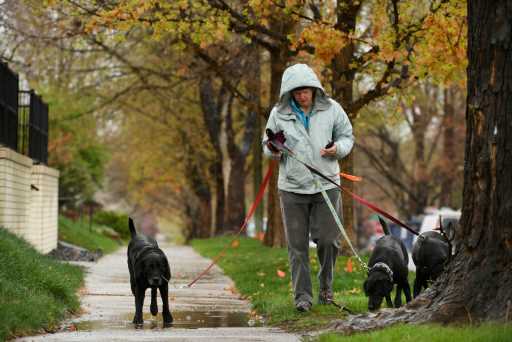So you adopted a dog during the pandemic. Perhaps you just moved here pup in tow. Maybe you’re thinking about getting a dog. With all the dog-friendly restaurant patios and hiking trails, the Denver metro area is a howl of a good place for dogs and their owners.
In fact, Denver has more dogs than children. Last year, Smart Asset, a financial services resource website, ranked Denver the 13th dog-friendliest city in the United States.
Let’s talk about all these dogs, though.
It’s summer and the temperature is rising. Cracking your car windows doesn’t provide enough ventilation if you leave your dog in the car even on a mild day. If it’s 75 degrees outside and you’re in the coffee shop for just ten minutes waiting for your latte, your car’s interior temperature will be 100 degrees by the time you get back in. When it’s 100 degrees outside, the inside temperature will rise to 140 degrees in 15 minutes. That’s a recipe for lethal heatstroke. Four years ago, the Colorado legislature passed a law making it legal to break into a locked car to rescue an at-risk child, cat or dog. Leave your dog in a hot car too long and you may end up with a broken window, if you’re lucky, if you’re not, a dead dog.
Cold outside? Once the temperature drops below freezing, dogs are at risk of getting hypothermia, frostbite, and even dying. Cold-tolerant breeds like huskies and chows have a double coat and can handle the chill. Puppies, small dogs, elderly dogs, and dogs that lack an undercoat are particularly vulnerable to the cold. Keep these dogs inside most of the time come winter. On the flip side, dogs with double coats should not be shaved in the summer. Without that insulating undercoat, they can overheat more easily. It’s like ripping out your home’s insulation thinking it’ll be cooler inside.
Hiking a fourteener? Leave Fido at home. Some dogs can handle a nine-hour hike but most cannot, especially on sharp talus. Mountain rescue organizations report that they are being called more frequently to rescue dogs from the mountain top. Dogs will follow you until they collapse. Know their limits which diminish as they grow older. And bring water.
Dogs do not sweat; rather they cool down through panting. Moisture from their mouth and tongue evaporates as they pant. When moisture turns to vapor it takes energy in the form of heat leaving the body cooler. As with sweating, the dog body needs to replace lost moisture by drinking water. Brachycephalic dogs, those with shorter snouts like pugs and boxers, are more prone to overheating because their short muzzles make panting less efficient.
So you’ve packed plenty of water, a leash, and plastic poo bags for a hike. Once that bag is filled, do everyone a favor and take it with you. Nothing spoils a gorgeous mountain view more than a bright orange bag of poo. We don’t need to see that and park rangers have bigger things to do than pick up after dog owners. Seriously, bring extra bags and triple bag it or put the poo bag in one of those vinyl, reusable doggy bags made to lock away the smell while you hike. Don’t be a poopetrator!
Heading to the dog park? Here’s another bit of unsolicited advice. While dogs are social animals, they prefer to play with dogs they know. The dog park can actually be stressful for dogs. Know your dog. My dog hasn’t been to a dog park since she was young. She is great with her dog buddies, cats, horses, parrots, and chickens but picks fights with dogs she doesn’t know.
Speaking of chickens, some dogs see nuggets at the sight of a hen and will kill chickens with homicidal glee. They can’t help themselves. Before you hatch a batch of eggs prepare accordingly.
Dogs have been by our sides for more than 20,000 years. Life in the Denver metro area poses unique challenges for our canine pals. With a little extra care, our best friends can really thrive.
Krista L. Kafer is a weekly Denver Post columnist. Follow her on Twitter: @kristakafer.
To send a letter to the editor about this article, submit online or check out our guidelines for how to submit by email or mail.
Source: Read Full Article
